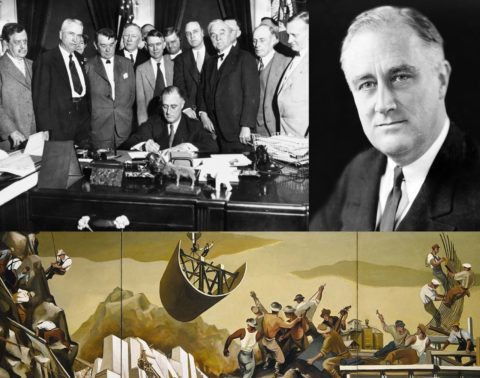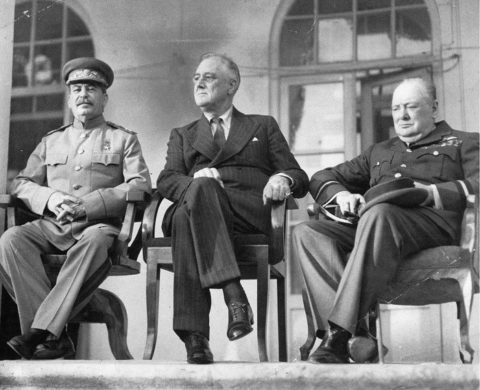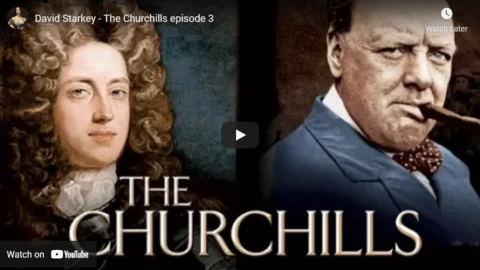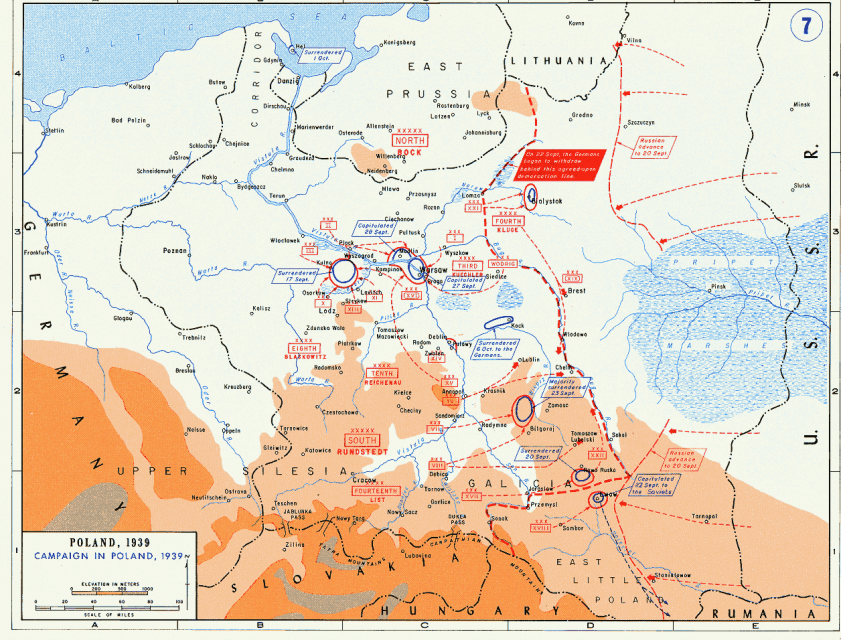World War Two
Published 29 Dec 2022The last week of 1943 is a busy one. Stalin deports the Kalmyk minority from Kalmykia, the escapees from Fort IX get away, and the US President moves to found the post-war UN.
(more…)
December 30, 2022
Stalin Deports An Entire Ethnicity – War Against Humanity 093
December 11, 2022
An Amphibious Landing to take Rome? – 224 – December 10, 1943
World War Two
Published 10 Dec 2022There are plans afoot to hit the enemy from behind in Italy. Allied leaders are meeting again in Cairo to go over other plans, notably what to do about China and Burma. There is active fighting on two fronts in Italy too, though this week it doesn’t go particularly well for the Allies. Attacks in the USSR are unsuccessful for the Soviets, but do go well for the Germans, and there are Allied attacks by air in the Marshall Islands and over France.
(more…)
December 4, 2022
Operation Overlord Confirmed at Teheran – WW2 – 223 – December 3, 1943
World War Two
Published 3 Dec 2022The Teheran Conference is in full swing and the Allied leadership and plan for a cross channel invasion of Europe is agreed upon by Stalin, Churchill, and Roosevelt. There are new Allied attacks across Italy, but at Bari a German air raid releases deadly poison gas.
(more…)
December 2, 2022
Bombing Berlin with Ed Murrow of CBS – War Against Humanity 089
World War Two
Published 1 Dec 2022Ed Murrow accompanies the RAF on a bombing raid on Berlin, and files one of his most iconic broadcasts with CBS. In Teheran, Winston Churchill walks out on a dinner with Joseph Stalin, after the USSR Premiere suggests mass murdering German officers.
(more…)
November 27, 2022
The Costliest Day in US Marine History – WW2 – 222 – November 26, 1943
World War Two
Published 26 Nov 2022The Americans attack the Gilbert Islands this week, and though they successfully take Tarawa and Makin Atolls, it is VERY costly in lives, and show that the Japanese are not going to be defeated easily. They also have a naval battle in the Solomons. Fighting continues in the Soviet Union and Italy, and an Allied conference takes place in Cairo, a prelude for a major one in Teheran next week.
(more…)
November 20, 2022
A Conspiracy to kill America’s President? – WW2 – 221 – November 19, 1943
World War Two
Published 19 Nov 2022A torpedo attack against the President; a Marine invasion in the central Pacific that turns very bloody in a hurry; German counterattacks in the Soviet Union; a bombing raid in Italy against a secret weapons site — all of that this week.
(more…)
September 2, 2022
The winner in 1932 campaigned against high taxes, big government, and more debt. Then he turned all those up to 11
At the Foundation for Economic Education, Lawrence W. Reed notes that we often get the opposite of what we vote for, and perhaps the best example of that was the 1932 presidential campaign between high-taxing, big-spending, government-expanding Republican Herbert Hoover and Franklin Delano Roosevelt, who ran against all of Hoover’s excesses … until inauguration day, anyway:

Top left: The Tennessee Valley Authority, part of the New Deal, being signed into law in 1933.
Top right: FDR (President Franklin Delano Roosevelt) was responsible for the New Deal.
Bottom: A public mural from one of the artists employed by the New Deal’s WPA program.
Wikimedia Commons.
If you were a socialist (or a modern “liberal” or “progressive”) in 1932, you faced an embarrassment of riches at the ballot box. You could go for Norman Thomas. Or perhaps Verne Reynolds of the Socialist Labor Party. Or William Foster of the Communist Party. Maybe Jacob Coxey of the Farmer-Labor Party or even William Upshaw of the Prohibition Party. You could have voted for Hoover who, after all, had delivered sky-high tax rates, big deficits, lots of debt, higher spending, and trade-choking tariffs in his four-year term. Roosevelt’s own running mate, John Nance Garner of Texas, declared that Republican Hoover was “taking the country down the path to socialism”.
Journalist H.L. Mencken famously noted that “Every election is a sort of advance auction sale of stolen goods.” If you agreed with Mencken and preferred a non-socialist candidate who promised to get government off your back and out of your pocket in 1932, Franklin Roosevelt was your man — that is, until March 1933 when he assumed office and took a sharp turn in the other direction.
The platform on which Roosevelt ran that year denounced the incumbent administration for its reckless growth of government. The Democrats promised no less than a 25 percent reduction in federal spending if elected.
Roosevelt accused Hoover of governing as though, in FDR’s words, “we ought to center control of everything in Washington as rapidly as possible.” On September 29 in Iowa, the Democrat presidential nominee blasted Hooverism in these terms:
I accuse the present Administration of being the greatest spending Administration in peace times in all our history. It is an Administration that has piled bureau on bureau, commission on commission, and has failed to anticipate the dire needs and the reduced earning power of the people. Bureaus and bureaucrats, commissions and commissioners have been retained at the expense of the taxpayer.
Now, I read in the past few days in the newspapers that the President is at work on a plan to consolidate and simplify the Federal bureaucracy. My friends, four long years ago, in the campaign of 1928, he, as a candidate, proposed to do this same thing. And today, once more a candidate, he is still proposing, and I leave you to draw your own inferences. And on my part, I ask you very simply to assign to me the task of reducing the annual operating expenses of your national government.
Once in the White House, he did no such thing. He doubled federal spending in his first term. New “alphabet agencies” were added to the bureaucracy. Nothing of any consequence in the budget was either cut or made more efficient. He gave us our booze back by ending Prohibition, but then embarked upon a spending spree that any drunk with your wallet would envy. Taxes went up in FDR’s administration, not down as he had promised.
Don’t take my word for it. It’s all a matter of public record even if your teacher or professor never told you any of this. For details, I recommend these books: Burton Folsom’s New Deal or Raw Deal; Murray Rothbard’s America’s Great Depression; my own Great Myths of the Great Depression; and the two I want to tell you about now, John T. Flynn’s As We Go Marching and The Roosevelt Myth.
For every thousand books written, perhaps one may come to enjoy the appellation “classic”. That label is reserved for a volume that through the force of its originality and thoroughness, shifts paradigms and serves as a timeless, indispensable source of insight.
Such a book is The Roosevelt Myth. First published in 1948, Flynn’s definitive analysis of America’s 32nd president is arguably the best and most thoroughly documented chronicle of the person and politics of Franklin Delano Roosevelt. Flynn’s 1944 book, As We Go Marching, focuses on the fascist-style economic planning during World War II and is very illuminating as well.
August 28, 2022
Kharkov Changes Hands for the Fourth Time – WW2 – 209 – August 27, 1943
World War Two
Published 27 Aug 2022As the war grows ever more ferocious, some people are unfortunate enough to see the front line arrive to their villages, towns, and cities multiple times.
(more…)
August 16, 2022
Manstein Goes Great War Style – WW2 – 207 – August 13, 1943
World War Two
Published 13 Aug 2022From Sicily to Spas-Demensk, the Axis continue conceding ground to the Allies this week. But the fighting is still tough. The Wehrmacht has halted the Red Army offensive in the Kuban, and the British and American armies have neither the strength nor the willpower to press the advantage against Axis troops retreating to the Italian mainland.
(more…)
May 18, 2022
Trident: The Allied Plan to Win the War – Time Ghost News Flash
World War Two
Published 17 May 2022Washington, May 1943. It was the largest Anglo-American conference of the war so far. With the Axis being defeated in North Africa, the Mediterranean, and New Guinea, the need to agree on new strategic goals arose inside the Combined Chiefs of Staff. A new course of action was to be set against Italy, Japan, and Germany to capitalize on the recent successes. But debates and old dilemmas heated up when it came to resources, manpower, and the question “where to attack next”.
(more…)
May 12, 2022
QotD: De Gaulle and FDR
It was more profound than that. France was now too small as well, and that is the reason why de Gaulle’s story is in the end a tragedy. Postwar America simply could not permit France to continue as she had. Washington would not risk another 1939. The former powers of Europe had to be cut down to size and compelled to get on with one another.
De Gaulle’s struggles with Churchill were, by comparison, lovers’ tiffs. Churchill, like most civilized Englishmen, loved France, “that sweet enemy”, as Philip Sidney called her. While de Gaulle was cold to veterans of the Resistance, Churchill — when he went to Paris to meet them — was so moved by their bravery that he was in tears for most of the day.
De Gaulle’s quarrel with Roosevelt was based on real loathing. Washington’s vision for postwar Europe, in which the old nations would be diminished and homogenized, was directly opposed to de Gaulle’s idea of a French resurrection in glory and might. Washington loved and promoted the idea of a Europe dominated by supranational bodies, and would later use Marshall aid and the CIA to spread the idea of a European union. Jean Monnet, one of the founders of the eventual European superstate, was much more welcome in the U.S.A. than de Gaulle, whom FDR once airily dismissed as “the head of some French committee.” No doubt, this was what Roosevelt wished he was. Nancy Mitford, in her satirical 1951 novel, The Blessing, neatly caricatured this American unifying vision of the new Europe in the figure of the appalling American world-reforming bore, Hector Dexter, who dreamed of seeing a bottle of Coca-Cola on every European table:
When I say a bottle of Coca-Cola I mean it metaphorically speaking, I mean it as an outward and visible sign of something inward and spiritual. I mean it as if each Coca-Cola bottle contained a djinn, and as if that djinn was our great American civilization ready to spring out of each bottle and cover the whole global universe with its great wide wings.
In May 1962, de Gaulle would oppose to this his assertion that Europe could not be real “without France and her Frenchmen, Germany and her Germans, Italy and her Italians.” He said (a recording of the performance still exists) that Dante, Goethe, and Chateaubriand “belong to Europe,” precisely because they spoke and wrote as Italians, Germans, or Frenchmen. They would not, he jeered, have served Europe much if they had been stateless and had written in some form of Esperanto or Volapük.
Peter Hitchens, “A Certain Idea of France”, First Things, 2019-04.
January 24, 2022
David Starkey – The Churchills episode 3
Whitehall Moll History Clips
Published 29 May 2019How did Winston Churchill draw on the lessons of his ancestor John Churchill to fight World War II? The Duke of Marlborough’s influence is apparent as Dr David Starkey explains
December 24, 2021
How Hitler, Churchill, Roosevelt, and Stalin Spent Christmas – WW2 Special
World War Two
Published 23 Dec 2021They might be four of the most powerful politicians and/or military leaders on earth, but they are also citizens of their respective countries and today we take a look at what they do over the traditional Christmas holidays in 1942.
(more…)
November 19, 2021
The Allied 1942 Plan to Invade Europe – WW2 Special
World War Two
Published 18 Nov 2021The second front has been opened, and Allied forces are invading Vichy French Northwest Africa. But did you know that it could very well have been an invasion of Europe taking place right now instead? Let’s examine how this idea came about, and why it never worked out.
(more…)
September 28, 2021
Debunking the notion that Stalin was an innocent victim of Hitler
At Instapundit, Ed Driscoll links Jakub Grygiel’s review of a new look at World War 2 in Europe, Stalin’s War by Sean McMeekin, which includes a bit of debunking about the relationship between Hitler and Stalin from 1939 to 1941:

Translation of the Russian caption for this image:
People’s Commissar of Foreign Affairs of the USSR V.M. Molotov signs a friendship and border treaty between the USSR and Germany. Among those present: I.V. Stalin, translator of the Ministry of Foreign Affairs V.N. Pavlov, German diplomat G. Hilger (“truncated” version of the photograph of M. Kalashnikov distributed on the net)
Photograph attributed to Mikhail Mikhaylovich Kalashnikov (1906-1944) via Wikimedia Commons.
Stalin was always interested in a war, especially one that would pit the other powers against each other. The expansion of Soviet influence and control required the weakening of the other powers, in particular the Western ones that were opposed to the Communist virus. For Stalin, therefore, the growth of Nazi Germany was a great opportunity: a violent and expansionistic power in the middle of Europe that could take the first swing against the polities standing on his path. Unsurprisingly, the Soviet tyrant was deeply disappointed when France and Britain signed the Munich Agreement with Nazi Germany in 1938 postponing the great European war that he desired. The 1939 Ribbentrop-Molotov Pact coordinated the efforts of Hitler and Stalin, but it benefited the latter more, allowing him to conquer a large swath of Polish territory with minimal effort, eliminating one of the staunchest opponents to Russian westward expansion. A year later, by murdering almost 22,000 Polish officers in Soviet captivity, Stalin further weakened the Polish obstacle to his expansion. “Nations which had been ruled by powerful aristocracies,” Stalin told once to the Yugoslav Milovan Djilas, “like the Hungarians and the Poles, were strong nations” — and, fearing them, he sought to eliminate them. Then, while Germany invaded France, Stalin took over the three Baltic states in a further step westward.
Hitler’s decision to invade Russia in mid-1941 was a surprise to Stalin, but not because he was expecting a lasting peace on his western frontier. Rather, as McMeekin documents, Stalin had ordered very rapid and large military preparations, building airbases and placing forces near the border with the Third Reich in the first half of 1941. None of them were in a defensive posture, and presented a vulnerable high value target to Nazi attacks. When Hitler decided to attack the USSR in June 1941, these Soviet forces were easy pickings for the well-organized, trained, and war tested German army. McMeekin here expands and amends a bold thesis offered in 1990 by Viktor Suvorov, a pseudonym for a GRU agent who defected to the West in the late ’70s and became a historian, that argued that Stalin was actively planning an attack on Germany but was preempted by Hitler. While Suvorov was excessive in his claim that the Red Army was ready for an offensive campaign in 1941 (because, among other reasons, the officer corps was still in shambles after Stalin’s purges) and that Stalin had plans to conquer Europe, he argued that the USSR was never a status quo power satisfied in its borders. After all Soviet Russia had already attempted to march westward in 1920 and was stopped only by the Poles in a desperate battle near Warsaw (the “Miracle on the Vistula”). This westward vector and ambition of Moscow did not abate, and had to pause because of Hitler’s rise and the might of Nazi Germany. As McMeekin points out, the Soviet military posture in 1941 makes no sense if the goal was to defend Soviet-held lands, suggesting that Stalin was thinking of pouncing on Berlin, now the last remaining continental power in Europe. As the Soviet tyrant himself put it, the USSR no longer needed to be locked in a defensive posture, and was “a rapacious predator, coiled in tense anticipation, waiting for the chance to ambush its prey.”
Military situation in Poland, 14 September 1939 (map does not show Slovak Army activity in southern Poland).
United States Military Academy, Department of History via Wikimedia Commons.Stalin, that is, was not an innocent victim of Hitler. Not only he was an active partner from 1938 until 1941, but also he had geopolitical aspirations that were more ambitious than those held by Hitler. And he pursued them methodically and ruthlessly, leaving a trail of death that dwarfed the one produced by the Nazis.
McMeekin then focuses on how the Western allies, Churchill but especially FDR, abetted Stalin’s ambitions. This part of the book is fascinating and depressing at the same time. In a nutshell, Stalin obtained from FDR more than he expected: territory, influence, and materiel. And he did not give anything in exchange for it because FDR and his advisors never asked him for it. For instance, FDR supported the Lend-Lease program, putting his friend Harry Hopkins in charge. Under this program of military aid, the United States supplied a massive amount of weapons, trucks, airplanes, tanks, foodstuff to the Soviet Union in the months of its greatest need, as German troops were driving deep into Russia while the vaunted Soviet armies were melting away. Without such aid, the USSR would have likely been unable to stop the German onslaught and certainly would have been incapable of mustering the resources necessary to push westward. Hence, in this moment there was a good strategic rationale for the American support of Stalin’s defensive efforts against Nazi Germany.
Prior to the launch of Operation Barbarossa, you’d have been hard-pressed to find a more anti-Soviet leader than Winston Churchill, but he immediately recognized that Stalin was more useful to the British as an ally than as a passive enemy. Earlier this year, McMeekin wrote that Stalin “could not have asked for a friendlier British government” than Churchill’s wartime coalition. As Connor Daniels wrote in response at The Churchill Project:

The “Big Three” meet at Tehran, 28 November-1 December, 1943.
Photo attributed to US Army photographer, via Wikimedia Commons.
Churchill’s support for Stalin during the Second World War followed from a simple calculus of the lesser of two evils. Britain could only take on one evil empire at a time, and, of the two, Churchill believed that Nazi Germany posed the greater threat to liberty. He famously remarked, “If Hitler invaded Hell I would make at least a favourable reference to the Devil in the House of Commons.” McMeekin attempts to sidestep this harsh reality, writing: “Whether or not the payoff was worth the price is a question well worth debating.” Churchill’s alliance with the Soviets stands or falls on this question: was Nazi Germany or the Soviet Union the greater danger in 1939?
With hindsight, one can easily marshal facts that portray Soviet communism as the greater evil. According to the best available estimates, the Stalin regime killed 20 millions of its own citizens. Nearly six million of those deaths occurred during the 1932–33 famine brought about by Stalin’s collectivization policies. While Nazi Germany also killed 17 million civilians, most of those deaths occurred after Hitler’s invasion of the Soviet Union in 1941. Thus, on the eve of the Second World War, one could argue — as Chamberlain and the appeasers did — that Nazi Germany served as a useful bulwark against a greater danger: the Soviet Union.
This analysis, however, misses a crucial point — one that Churchill recognized. Until 1939, the horrors of the Soviet regime had been primarily restricted to its own borders, while Nazi Germany had already made its expansionist ambition clear. In 1938, Germany annexed Austria. Later that year, Germany seized the Sudetenland. In 1939, the rest of Czechoslovakia passed under Hitler’s control. The Nazi doctrine of Lebensraum dictated even greater expansion. By contrast, Stalin’s doctrine of “socialism in one country” had kept the Soviet Union relatively peaceful until the Second World War began.





